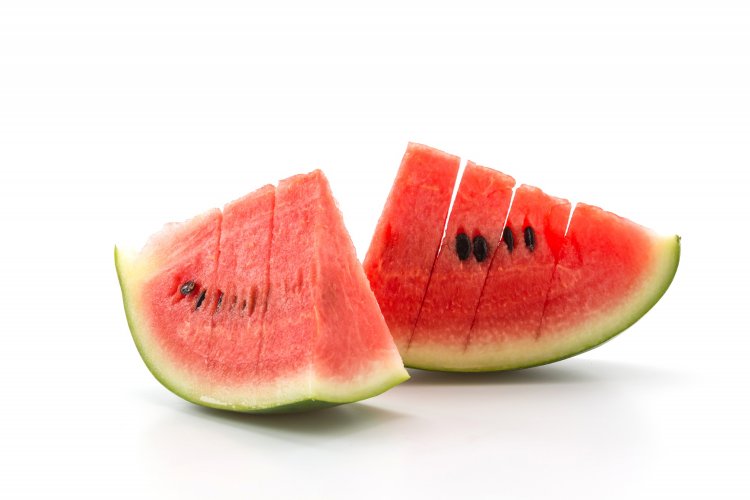Exploring the World of Watermelon: A Deep Dive into Its Origins, Nutrition, Culinary Uses, Health Benefits, and Cultural Significance
Watermelon, revered as the quintessential summer fruit, holds a special place in the hearts of many. Its juicy flesh, vibrant colors, and refreshing taste make it a favorite during hot days. However, beyond its culinary allure, watermelon offers a plethora of health benefits, alongside a rich history and cultural significance that warrant closer examination.

Origins and History:
The journey of watermelon began in the arid lands of the Kalahari Desert in Africa, where wild varieties still flourish. Ancient civilizations, including the Egyptians, cultivated watermelon as early as 2000 BC. Evidence of its consumption and cultivation is found in hieroglyphics and remnants discovered in Pharaoh tombs. From Africa, watermelon cultivation spread to the Mediterranean region, eventually reaching Europe and later the Americas through trade routes and colonization.
Botanical Characteristics:
Watermelon, scientifically known as Citrullus lanatus, belongs to the Cucurbitaceae family, which includes cucumbers, pumpkins, and squash. It is characterized by sprawling vines that produce large, oval or spherical fruits. The outer rind, typically green with mottled stripes or spots, encases the sweet, juicy flesh, which can vary in color from deep red to pink or yellow. Traditional varieties contain black seeds, although seedless cultivars have gained popularity in recent years.
Nutritional Profile and Health Benefits:
Beyond its delightful taste, watermelon is a nutritional powerhouse, offering numerous health benefits:
- Hydration: With a water content of approximately 92%, watermelon is an excellent hydrating fruit, perfect for combating dehydration during hot weather.
- Vitamins and Antioxidants: Watermelon is a rich source of vitamins A and C, essential for immune function, skin health, and vision. It also contains antioxidants like lycopene, which may help reduce the risk of certain diseases, including heart disease and certain types of cancer.
- Electrolytes: Watermelon contains essential electrolytes such as potassium, which helps regulate blood pressure and muscle function.
- Anti-inflammatory Properties: Some studies suggest that compounds found in watermelon may possess anti-inflammatory properties, potentially benefiting conditions such as arthritis and inflammation-related diseases.
- Digestive Health: The high water and fiber content in watermelon can support digestive health by promoting regularity and preventing constipation.
Culinary Uses:
Watermelon's versatility extends beyond slicing and serving. While it's commonly enjoyed fresh, it can also be incorporated into a variety of culinary creations. From salads and salsas to smoothies and sorbets, watermelon adds a refreshing sweetness to both savory and sweet dishes. In many cultures, watermelon is also pickled, candied, or juiced for beverages.
Cultural Significance:
Watermelon holds a significant place in various cultures and traditions worldwide. In many countries, it is a symbol of summer abundance and is prominently featured in picnics, barbecues, and festivals. In the United States, watermelon is closely associated with Independence Day celebrations, where it is often served in large quantities at outdoor gatherings. In China, watermelon is a popular gift during the Mid-Autumn Festival, symbolizing unity and abundance.
Fun Facts:
- The world's heaviest watermelon on record weighed over 350 pounds (159 kg), grown by Chris Kent of Sevierville, Tennessee.
- Square-shaped watermelons are grown in Japan for easier stacking and storage, although they come at a premium price.
- Competitive watermelon seed-spitting contests are held in various parts of the world, with participants aiming for impressive distances.
In conclusion, watermelon is not just a delicious fruit; it is a symbol of summer, a source of nutrition, and a cultural icon. Its journey from the deserts of Africa to tables around the world is a testament to its enduring popularity and significance. So whether enjoyed fresh on a hot day or incorporated into culinary creations, the allure of watermelon transcends borders and generations, making it a beloved favorite worldwide.
#Watermelon #History #BotanicalCharacteristics #Nutrition #HealthBenefits #CulinaryUses #CulturalSignificance #FunFacts
Disclaimer:
The information provided in this article is for educational purposes only and should not be considered medical advice. If you have any health concerns or are experiencing symptoms, it is important to consult with a healthcare professional, such as a doctor or clinic, for proper diagnosis and treatment. Always seek the advice of your doctor or other qualified health provider with any questions you may have regarding a medical condition. Do not disregard professional medical advice or delay in seeking it because of something you have read in this article.
What's Your Reaction?





















